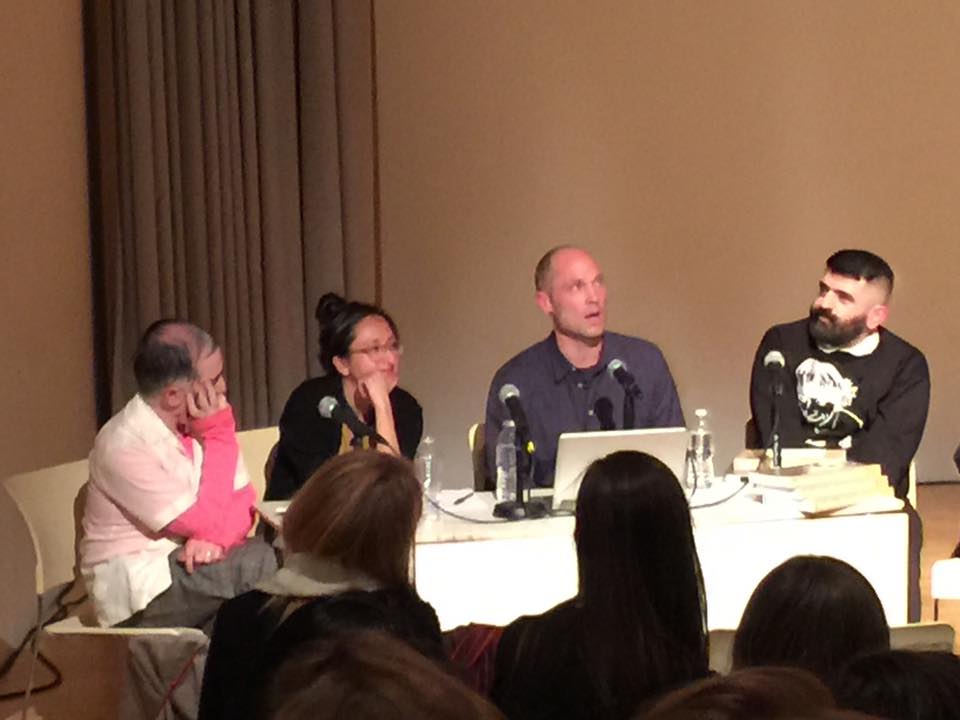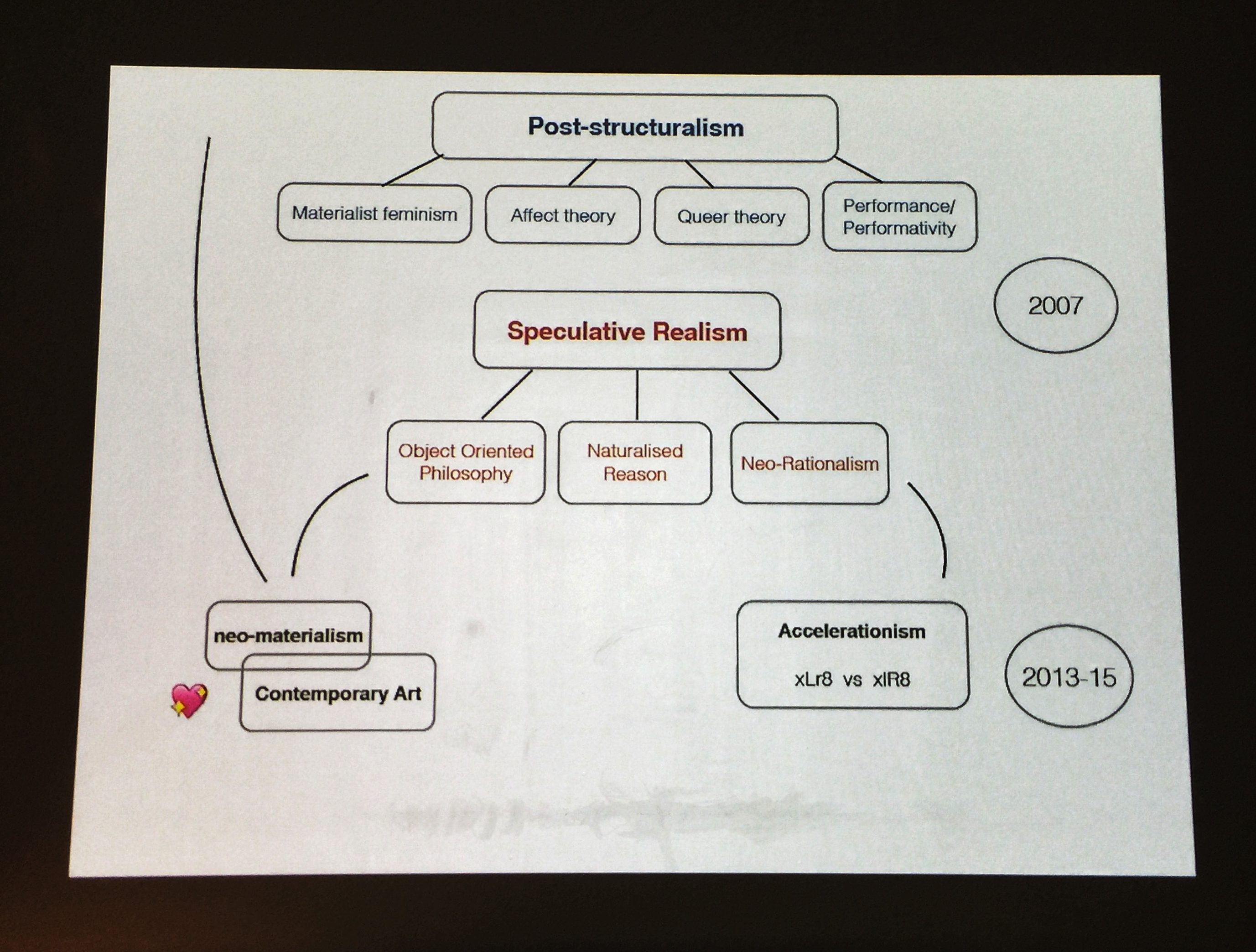NOTE: This short paper was given as part of a panel put together for the launch of Realism, Materialism Art volume edited by Christoph Cox, Jenny Jaskey and Suhail Malik at New Museum in New York.
Thanks everyone for being here tonight and also thanks to Suhail, Christopher, and Jenny for extending an invitation for me to be a respondent at this book launch.
I will briefly, if not also chaotically, address the philosophical, political, and anthropological accounts of why and how the academic mainstream tries to reject, suppress and at the same time, recuperate the discourse of accelerationism, and what actions or inactions by those involved in the discourse contribute to the success or failure of these strategies.
First, consider the relationship between Speculative Realism (SR) and acceleration: I’d like to bring up the fact that both Nick and Alex of the Manifesto fame come from a speculative realist background. Nick was one of the founders of the Speculative Heresy blog and Alex contributed to his own philosophical blog titled Splintering Bone Ashes. But what shifted their interest from a purely philosophical one to political economy was the 2008 economic crisis and the insufficiency of the Left’s response to it. These failed Leftist attempts included the Arab spring, the Occupy Wall Street movement and the new student movements around the world, since they were unable to properly articulate a new generalized, universal and practical politics for the conditions of the 21st century.
You may note that the #Accelerate Manifesto, both in form and content, is also indicative of the limited utility philosophy might have in a crisis situation like that of 2008 and on, hence, the need for a full-fledged turn away from speculative philosophy towards proper political economy. However, it is important to note that this political turn was filtered mostly through speculative realism, on the positive side, because of their shared emphasis on materiality & the place of technology, and on the negative, through SR’s spectacular failure in offering a new epistemology and the accelerationist demand for one. And yet, SR did offer a way out of Continental theory loops, via the works of Ray Brassier and Reza Negarestani, mostly through their defense of the idea of Enlightenment and reason or what later was called neorationalism. Now the accusation that Speculative Realism is apolitical is unfair and really baseless, not because Brassier and Negarestani address political matters directly – because usually they don’t – but rather, because their work has obvious political implications that are ramified through the accelerationist thought by others. In particular, their brand of realism offers a new way of thinking about the political that is not overdetermined and therefore limited by Western anarcho-Marxist cynicism towards government institutions and social planning, or the dominant discursive politics of poststructuralism or the Latourian hegemonic hyper-relativism that insists everything is a network.
More specifically, Brassier was never interested in the mysticism or even nihilist side of the SR and through his work, he pushed the arguments of nihilism over their limit and in the process found ways to synthesize Laruelle’s rigorous materialist immanence with Meillasoux’s speculative materialism, recombining them with his new found interest in Wilfred Sellars’s concepts of the scientific & manifest image. In contrast, Negarestani’s work is the meeting place for speculation and Charles Sanders Peirce, particularly due to the author’s re-deterministic approach to both the past and future, a kind of reverse historical materialism with an idealist bent, in which the notion of the local stands for what we normally call the material and the global for ideal.
This approach in a way represents the abandonment of the phenomenological binary of time and space, focusing instead on how insides and outsides are constituted through the movement and navigation of thought or cognitive resources of the collective general intellect. Lastly, another shade of speculative related accelerationism, to which I belong, emerges from Suhail Malik’s work on political economy and finance via his interest in the works of Jonathan Nitzan & Shimshon Bichler resulting in his massive essay for Collapse Vol. VIII titled “The Ontology of Finance” in which he argues that acceleration should abandon Marxist notions of labour and production and utilize finance as a constructive technology towards a post capitalist future.
It’s quite astonishing how a group of smart and highly educated people for any reason other than protecting their own academic turf or intellectual popularity miss such a straightforward propositions and do their best to misrepresent if not also tarnish these new sets of ideas.

Photograph by Jeffrey Andersson. Pictured (from left to right): Suhail Malik, Natalia Zuluaga, Christoph Cox, and Mohammad Salemy.
Now, in the style of the Oscars Presenters: here are 5 top nominees for ill informed arguments that more or less summarize the opposition to accelerationism.
-Acceleration’s embrace of technology is a return to positivism and empiricism in both political economy and sociology, that abandons dialectics and embraces system theory.
-Accelerationism is about the veneration of sheer speed, and in a way nothing but a reappearance of futurism, that it is impatient to destroy the old order without considering the kind of Benjaminian warning from his Theses on the Philosophy of History about the emergency brake of the train of progress.
-A repetitive emphasis on Acceleration’s defining indebtedness to the Deleuze/Nick Land spectrum of accelerating capitalism either nihilistically toward a total collapse or constructively towards a pure libertarian form of global capitalism.
-There is also another form of criticism that is often wrapped in a Feminist/postcolonial wrapping paper that Acceleration is essentially a white boy club trying to mask itself as a new universalist political movement.
-Accelerationism is a form of reformism, a fresh coat of paint on the welfare state social democracy & Habermas, that offers technological and design solutions for essentially political and economic problems for which there can only be revolutionary hope.
Aside from these often repeated criticisms which measure Accelerationism with a historical sick inherited from the 20th century, I would like to offer a few insights and perhaps critiques and judge this intellectual movement from within its ranks and provide constructive insights on how to move forward from here.
-Abandoning social media to their adversaries and refusing to battle their opponents on a daily basis in various means, suggests, basically, abandoning the project of bringing these ideas to masses. The result of this is tolerating the formation of a clique by retreating to private social media, setting up walls which exclude those who do not fully support the main sets of accelerationist ideas and preventing political alliances and coalitions.
-Retreat to Marxism and the embrace of at least some aspects of the labour theory of value, in opposition to newer theories of political economy. The anthropological necessities like obtaining tenure positions after years of hard studying, embracing Marxist economic theories, or arguing for new readings of Marx that won’t offend the Marxists who are dominant in political economy discourse in universities. The signifier for this is how some Accelerationists never miss a chance to attack Nitzan & Bichler without providing a critique of their work, endorsing classical Marxists’ criticism of their Power Theory of Value proposed in the book Capital as Power.
– Avoiding a direct approach to real politics and also the politics of aesthetics and contemporary art, only talking esoterically that which is accessible only by the initiated. And, last year in the midst of the Gaza war when the new rationalist summer school was happening in Berlin, there was no attempt by people involved to relate the program to what was going on, this despite the fact that Ray has openly discussed the middle east in his interviews and has tacitly shown support for Palestinian self determination.
-Brassier more or less refuses to talk about the place of visual art in his thought, and not only did Reza never publish the Human Centipede paper from his e-flux talk in the winter of 2013, but surprisingly, last year he wrote an essay on the French artist Jean Luc Moulene, which according to a lot of people follows similar strategies which are often pursued in normative contemporary art writing, and have been criticized privately by artist and curators involved with new rationalism.
-Abandoning the term accelerationism and rebranding under something like the yello box of No Name / President’s Choice identity that is less offensive to the Marxist / poststructuralist / Latourian / neoliberal alliance which controls our Humanities academic departments, if not also museums and major galleries around the world.
-Not setting up institutions or processes that are themselves accelerationist fails to intervene politically, thereby to work on the margins of theory/academia. in effect giving up on building and enforcing a new hegemony as they have proposed.
There are also instances out there through which Accelerationism is not only discussed and promoted but put into practice:
1- The New Centre for Research & Practice (Jason Adams, Myself and Tony Yanick) ,
2- Fixing the Future platform (Diann Bauer, Joshua Johnson, Suhail Malik, myself and Keith Tilford),
3- Uberty.org (Joshua Johnson)
These three different accelerationist practices not only embrace technology or move fast in dealing with new forms of knowledge, but also because are forms of construction and enforcement of hegemonies. They support through action the notion of having and enforcing opinions and positions, and the desire to bring these positions in accessible ways to larger groups of people. Negating print elitism of academic publishing is amazing, but intentionally minimizing distribution to short print runs on high quality paper etc., or only working with those who are 110 per cent in support all of your ideas. enables an already-too-pervasive reluctance to building coalitions will never break these sets of ideas in larger groups of people and won’t culminate in social and political movements we used to witness in the 20th century.
What needs to be done? Since we don’t have a lot of time, I’d like to highlight a couple of propositions that might be helpful in moving forward:
-Further developing platforms for understanding how capitalism manages the future and how this mechanism, without destruction and bloodshed, can be salvaged towards a post capitalist future.
-Research towards bridging the gap between sciences, art and philosophy in productive ways that can guarantee that new knowledge will be more useful in navigating towards post-capitalism than helping the powerful to further complicate their existing power structures, a realization of what I call epistopolitics, which means the gains in knowledge even though the politically unaligned need to immediately become politicized towards emancipation.
